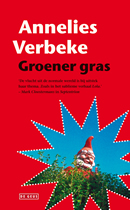Annelies Verbeke
Greener Grass (Groener gras)
A wonderful collection of tragicomic stories
Annelies Verbeke’s work has been praised for its bizarre take on people who are slightly out of the ordinary, who for all their unease have great reserves of emotion. In their existential discomfort they display varying degrees of loneliness, isolation and impotence, feelings of insignificance and rejection, but always counterbalanced by subtle irony and dry humour.
In Groener gras (Greener Grass), her third book, Annelies Verbeke brings together stories in which a succession of people step into the limelight, all of whose lives contain substantial hidden realms: a woman who becomes fond of a bull; a tough self-defence teacher whose heart melts when she looks after a small refugee girl. With their emotional isolation and longing for affection, the characters arouse sympathy and compassion, even if their self-control ends in a violent outburst. A postal worker, misunderstood by the people he lives with, his diligence unnoticed, puts on his best suit one day and goes out into the street with a gun. His hopelessness and wounded self-esteem lead us to see him as a tragic figure rather than simply a criminal.
Those who seem most recognisable are damaged characters, forced to deal with their own minor tragedies in the shadows of their public lives. A man visits a chat room and carefully builds up a promising friendship, but at his first real meeting with his online girlfriend he escapes. A retired couple, emigrating to sunnier climes, lose their dog, their most important bond, to an unnecessary dose of tranquillisers on the flight out. With the dead dog wrapped in a blanket in a taxi on the way to ‘their own beach’, the wife in particular realises ‘how much gradual loss had been abruptly revealed. How little there was left to say.’
In this book Annelies Verbeke’s prose excels at evoking gradual loss, in strange harmony with undertones in a kind of atonal ambiguity. Things that remain implicit weigh heavily upon the characters’ lives, but absurd touches, quirkily humorous traits and unexpected twists and turns add a bizarre light-heartedness to the shifting narratives, such as the story of a Don Johnson lookalike who makes a big mistake in assuming the woman he is addressing is the author of a love note. In Groener gras, Annelies Verbeke peoples her peculiar world with ardent, irresistible, intriguing characters.
Publisher
De Geus
Oude Vest 9
NL - 4811 HR Breda
TEL. +31 76 522 81 51
FAX +31 76 522 25 99
E-mail: [email protected]
Website: www.degeus.nl
Publishing details
Groener gras (2007, 224 pp)

Biography
Annelies Verbeke (b. 1976) became instantly famous with her successful first novel Slaap! (Sleep! 2003). The Dutch edition sold more than 70,000 copies and was published in eighteen countries. Her second novel, Reus (Giant, 2006), and her collection of short stories Groener gras (Greener Grass, 2007) attracted attention for her surprisingly unusual realism and lightly bizarre and absurd humour. Annelies Verbeke also writes columns, film scripts and plays. With her new novel, Vissen redden, a new highlight in her career, she strengthens her position as one of the most prominent authors of her generation.
‘My stories are usually about the underdog,’ says Verbeke, ‘because to my mind, he is closer to the essence of life, and is therefore more interesting in his quest for his own truth. I want to move people, make them laugh and give them a feeling of solidarity, in the hope that this – even if only briefly – will draw them a little closer together.’
Website: www.anneliesverbeke.com
Quotes
A wonderful collection of tragicomic fairytales for adults, beautifully articulated and full of unexpected twists and turns.
De Telegraaf
The clever thing about Greener Grass is that there seems to be very little going on around the everyday, slightly odd characters, yet their lives suddenly take a bizarre, felicitous or disastrous turn. Annelies Verbeke’s assured and evocative style lends the stories enormous eloquence.
De Volkskrant
Powerfully written scenes.
NRC Handelsblad
